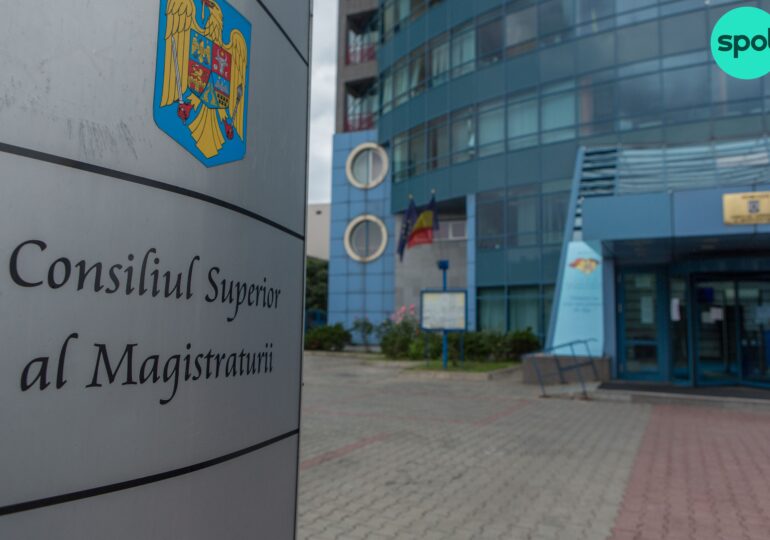The Romanian Superior Council of Magistracy (CSM) announced in a press release that its sections have decided, on Thursday, to convene general assemblies of judges and prosecutors on August 26-27, 2025, to discuss the draft amendment regarding service pensions and its implications on the status of magistrates.
„Considering the escalation of hostile public attitudes towards judges and prosecutors,” CSM draws attention to „repeated positions taken by representatives of the parties in the governing coalition,” aiming to blame the judicial system for the country’s economic and budgetary difficulties.
The Council notes that "the aggressive promotion (...) of the idea that the Prime Minister's intention (...) is actually to end certain privileges of magistrates" disregards the arguments of the judicial system and "creates a major risk of demoralizing judges and prosecutors" and of "seriously affecting the attractiveness of the judiciary among young people."
CSM considers that the Government's initiative "seriously affects the independence of justice," "violates the mandatory decisions of the Constitutional Court and the Court of Justice of the European Union," and is the result of an "inflexible, forceful, and authoritative stance of the executive power towards the judicial power."
Furthermore, "this attitude (...) is contrary to the constitutional principle of the separation and balance of powers" and "creates risks (...) regarding the fundamental rights and freedoms of citizens and the democratic path of Romanian society."
The Council received the draft law from the Ministry of Labor on August 20 and emphasizes that there was "no justification for this initiative," nor "any dialogue with the representatives of the judicial authority," even though the amendments directly affect their status.
Position of the High Court
Meanwhile, on Thursday, the High Court of Cassation and Justice (ICCJ) stated that it is following with "maximum concern" the debates regarding special pensions, pointing out that these signal "a significant regression" in the status of magistrates.
The supreme court criticizes the fact that, under the pretext of reform, the issue of salary and pensions of magistrates is recurrently brought into the public space by the executive power through legislative projects, conferences, statements, and media appearances, being presented as a "privilege."
"Speaking at the level of the executive power about cutting the so-called privileges actually means deliberately weakening the status of judges. In reality, it is not a benefit that is being cut, but the independence of justice, the balance of democracy," stated the ICCJ press release.
According to the court, reducing statutory guarantees risks demotivating active magistrates, making the profession unattractive to future candidates, and undermining the rule of law.
The ICCJ firmly rejects what it calls a distortion of reality and emphasizes that the independence of the judge is not a privilege but "a fundamental guarantee for every citizen and for the democratic functioning of the state."
Thus, the supreme court supports the position of the CSM and reaffirms its willingness to engage in dialogue with the other branches of the state.
Special Pensions Reform Stirred Magistrates
The Romanian Government could adopt, as early as next week, through assuming responsibility in Parliament, the second package of measures to reduce the budget deficit. Prime Minister Bolojan has already stated that this must be adopted by the end of August.
One of the most sensitive components of Package 2 is the reform of magistrates' pensions.
The Government has drafted a new bill which includes, among other things, their retirement at the standard age, gradually aligned with that of other contributors by 2036, and a minimum work experience of 35 years. The service pension is expected to be capped at 70% of the net income from the last month of activity.
In order to assume responsibility for the new special pension reform project, the Government needed the old legislative initiative (from Crin Antonescu's campaign) to be rejected. This step was taken by the Senate on Wednesday.
The main provisions of the law were announced by Ilie Bolojan on July 29. Following the premier's announcement, the system reacted vehemently.
Since then, the Superior Council of Magistracy (CSM) has consistently criticized the proposed measures regarding the retirement system of magistrates. Subsequently, voices from all levels were heard.
The heads of the main courts in the country have issued public messages expressing their solidarity with the actions of the Superior Council of Magistracy (CSM) and concern about the impact of the new proposals on the status of magistrates.
The presidents of the courts of appeal, tribunals, and local courts across the country have successively taken a stand.
Finally, the Superior Council of Magistracy has taken an official statement in which the international organization European Magistrates for Democracy and Freedoms (MEDEL) strongly condemns the denigration campaign against the Romanian judicial system, launched by the ruling parties under the pretext of reducing the budget deficit.

